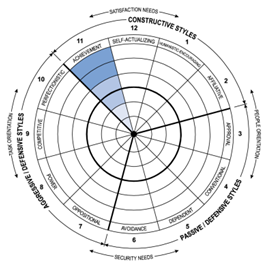In a recent blog, we introduced the Human Synergistics Circumplex™, a proven framework to measure, report, discuss and better understand individual and collective human behaviour, and their impact upon business and organisational performance (refer: Catching Smoke: A Proven Framework for Addressing Culture and Leadership).
Today’s blog focuses on one of the key Constructive styles – Achievement: what is it, why is it helpful and, if you think it might be lacking within your leadership and/or organisational culture, how can you enhance its presence?

So Just What is the Achievement Style?
Whether we’re looking at it from an individual leadership or broader organisational culture perspective, the Achievement style emphasises the setting and accomplishment of challenging yet realistic goals that improve performance.
While sometimes confused with the Competitive style, the Achievement style differs in that the focus is on improving one’s own performance as opposed to outperforming others (think of the sports stars who are always striving for their “personal best”).
In workplaces with an Achievement-focused culture, participants will generally feel expected to, for example:
- Set challenging yet realistic goals for themselves and others
- Work hard to achieve those goals
- Pursue a standard of excellence
- Think ahead and plan
- Focus on excellent and continual improvement.
Leaders high in the Achievement style will tend to, for example:
- Show enthusiasm
- Involve others in goal-setting and planning
- Explore alternatives before acting
- Be clear about their expectations of others
- Enjoy a challenge
- Believe in their own ability to achieve/impact (Achievement-focused individuals tend NOT to believe in fate, luck or chance as the determinant of success).
So Why is it Important?
Participants in workplaces with cultures high in the Achievement style, and supported by Achievement-focused leaders, are more satisfied, feel that they better “fit in” with and plan to stay with the organisation. They are more motivated, more willing to exert discretionary effort, and contribute more to problem-solving and change efforts.
When combined with a predominance of other Constructive styles, the research tells us clearly that Achievement cultures supported by Achievement-focused leaders facilitate better results at individual, team and organisational levels (research by Human Synergistics):
- Organisations: 32% more adaptable to changes in the external environment and 32% higher quality performance
- Teams: 28% more effective teamwork and 25% greater commitment to producing a quality result
- Individuals: 32% more motivated, 26% more satisfied and 25% more likely to stay with the organisation.
Sounds Good, How do we Get More of it?!
At an individual leadership level, for example:
- Use the language of Achievement and demonstrate personal enthusiasm (eg. “I’m confident that we can….”, “There is a real opportunity for us here…”)
- Set goals, write them down, plan for their achievement and regularly revisit your plan
- Be persistent when faced with challenges.
- Adopt a deliberate, problem-solving approach rather than a negative, emotive one
- Do not allow yourself to be distracted from the task at hand.
At a collective/workplace level, for example:
- Get the team involved in goal-setting and planning, regularly communicate and review progress towards the goals
- Focus on the continual improvement of product, services, systems and processes
- Recognise and celebrate collective achievements
- Identify and pursue opportunities to design jobs that allow individuals to plan their own work, include a variety of tasks, evaluate their own performance, encompass a”whole” service or product, and give them the opportunity to see the impact of their work.
So what are you waiting for? Consider what you can do to improve your individual and collective Achievement focus and drive real results in your business/organisation!
Search our blog for the series of “Focus on Leadership and Culture” articles in which we address the why, why and how of styles of other workplace culture and personal leadership styles. And of course, be sure to call if you’d like to explore the range of culture and leadership programs we have available to help transform your people, your team and/or your business/organisation.

